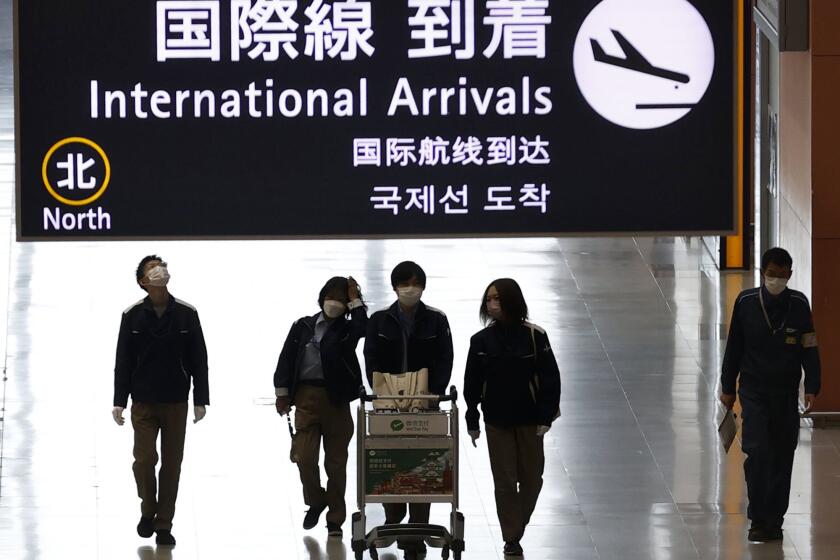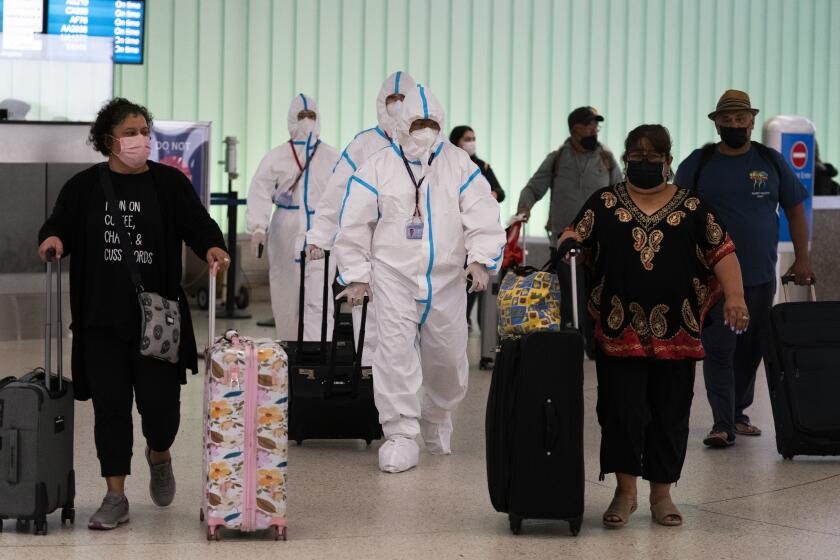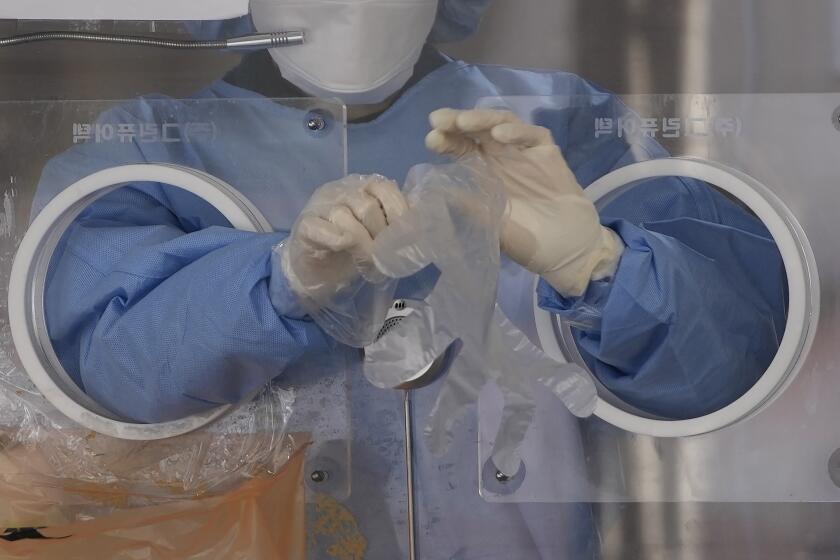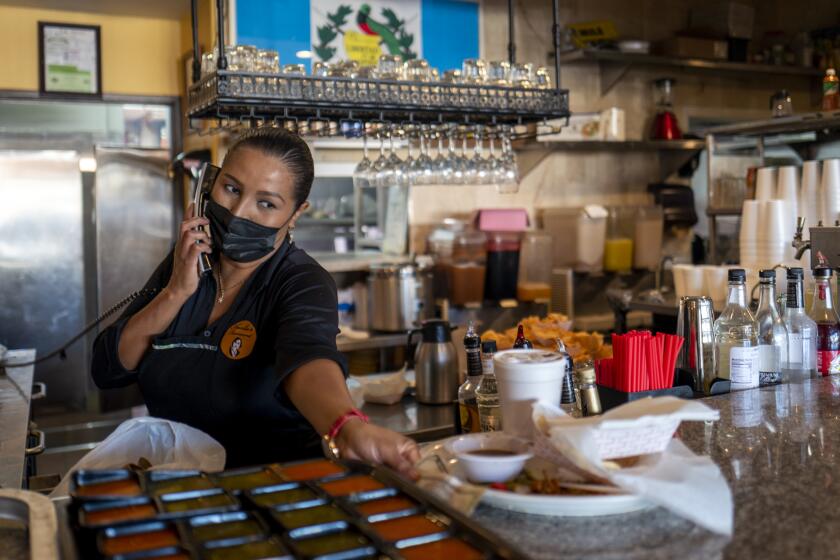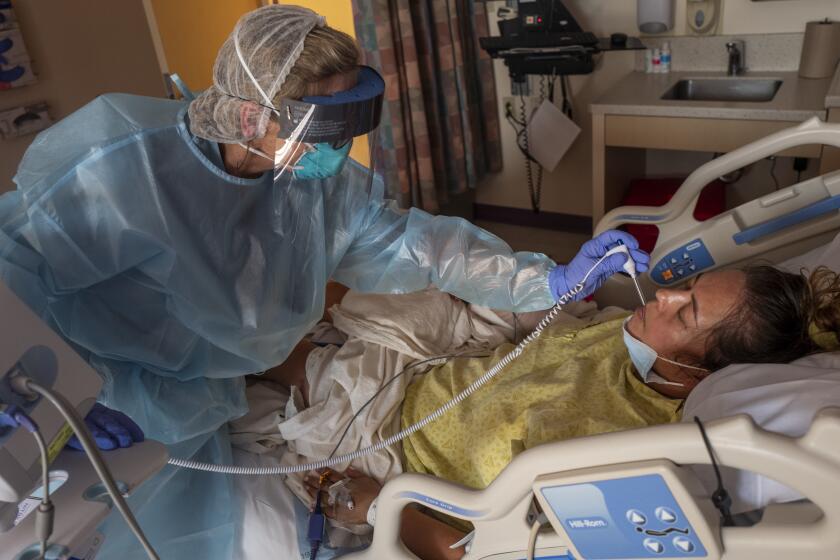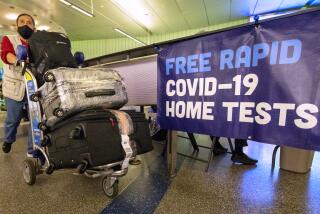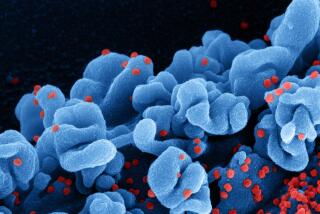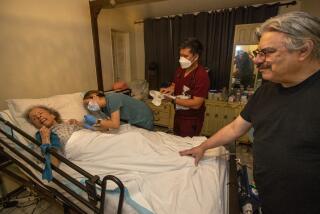California confirms nation’s first Omicron variant coronavirus case

As expected, the Omicron variant of the coronavirus, first detected in southern Africa, has reached the U.S., with the first case found in California.
- Share via
SAN FRANCISCO — The first U.S. case of the Omicron variant of the coronavirus has been confirmed in San Francisco, putting California at the center of the nation’s pandemic response once again.
Officials said the infected individual returned home from South Africa on Nov. 22. A few days after arriving, the person began to feel ill and got tested. On Monday, the result came back positive, and the virus specimen was subsequently analyzed and revealed to be the latest named coronavirus strain.
The person was fully vaccinated and had mild symptoms that did not require hospitalization. Officials said the individual’s condition was improving as of Wednesday.
There are no signs yet of any larger outbreak in the Bay Area, and state and federal officials emphasized that caution, rather than consternation, is called for.
In California, health and political leaders remain confident that the new variant will not require the reimposition of lockdowns or other restrictions. Rather, they said, this latest twist in the nearly 2-year-old pandemic reinforces the message they’ve long been trumpeting: More people should get vaccinated and boosted once they’re eligible.
“There’s more panic than information around this new variant,” Gov. Gavin Newsom said at a briefing Wednesday. “And that just means we have to keep our mind open, but maintain our vigilance.”
President Biden announces new measures as scientists try to determine how dangerous the new Omicron variant of COVID-19 will be.
The variant’s arrival was not unexpected. First detected last month, the strain has already been found in roughly two dozen countries.
“We knew that it was just a matter of time before the first case of Omicron would be detected in the United States,” Dr. Anthony Fauci, the U.S. government’s top infectious-disease expert, said during a briefing Wednesday.
Officials said the infected San Francisco resident is self-isolating. Close contacts have been identified and have tested negative so far, according to the U.S. Centers for Disease Control and Prevention.
The case was confirmed by the San Francisco Department of Public Health, with genomic sequencing conducted at UC San Francisco.
“The person recently traveled to South Africa and developed symptoms upon their return,” said Dr. Grant Colfax, San Francisco’s director of health. “And they did the right thing and got tested and reported their travel history.”
As more countries detect cases of the Omicron variant, conferences and business gatherings are being canceled. U.S. travel hasn’t yet been curtailed.
Colfax said he doesn’t anticipate altering the COVID-19 measures that are already in place, saying: “This is not where we were 20 months ago. We are in a much better place.”
San Francisco, he noted, has a high vaccination rate, and is confident in existing protocols.
“Our masking and vaccine requirements are among some of the most stringent in the country. These efforts have been very effective in helping us slow the spread of the virus,” Colfax said.
Citing privacy, health officials released few details about the individual. Newsom said the person was between 18 and 49 years old.
The dangers of the Omicron COVID-19 variant are unknown. But many Americans aren’t very worried.
“We must remain vigilant against this variant, but it is not a cause for panic,” the California and San Francisco departments of public health said in a joint statement. “To help detect and prevent the spread of this new variant, the state of California is increasing COVID-19 testing at our airports for arrivals from countries identified by the CDC.
“We recognize that everyone is exhausted, and the news of a new variant can be overwhelming,” the statement continued. “It is important that we collectively focus on the things we know prevent the spread of COVID-19 and its variants. Individuals should get vaccinated and boosted; wear your mask in indoor settings; get tested if you have symptoms; and stay home if you are sick.”
Still, the arrival of the highly mutated variant comes at what was already shaping up to be a particularly precarious time in California. Officials have long expressed concern that the one-two punch of the end-of-year holiday season and colder weather will increasingly push people to gather in crowded indoor settings where the risk of coronavirus transmission is especially high.
But whether Omicron ultimately proves to be more of a speed bump or a roadblock on California’s path to pandemic recovery remains to be seen.
Omicron’s impact on the COVID-19 pandemic will depend on a variety of factors that will take days to weeks for scientists to untangle.
Like San Francisco, officials in Los Angeles County and at the state level have also indicated they’re not currently contemplating significant new coronavirus-related restrictions in light of the emergence of the new variant.
When asked specifically about the possibility of renewed business or school shutdowns, Newsom said: “None of us want to see that happen. I certainly don’t want to see that happen. And I see no indication at this moment whatsoever that that’s in our immediate future, as long as we continue our nation-leading efforts.”
“It’s really important for folks to understand we have agency in this pandemic,” he said. “We’re not bystanders in this pandemic. It’s our decisions that will determine our fate and future.”
Much remains unknown about Omicron. Answers to the most pressing questions — whether the variant spreads more easily, can cause severe illness, or dodge some of the protection afforded by vaccines — likely won’t be known for a few weeks.
Officials note the pandemic is different this year, given the ample supply of vaccines, which should provide some protection against the new variant.
And while the enemy may be new, public health officials say the battle plan is familiar. The central thrust of those efforts remains getting as many people vaccinated as possible, and having adults avail themselves of booster shots when their time comes.
“We don’t know everything we need to know yet about the Omicron variant. But we know that vaccination is a safe and effective way to protect yourself from severe illness and complications from all known SARS-CoV-2 variants to date,” Dr. Rochelle Walensky, director of the CDC, said during a briefing Tuesday.
While experts are racing to understand the full ramifications of Omicron, the fact that it has so many mutations is unsettling.
Though mutations are not inherently bad news, scientists are concerned that some of those in Omicron might make the virus more transmissible or resistant to immunity generated by vaccines or previous infections.
“The thing that got everyone’s attention was the large number of mutations — around 50, much larger than previous variants. And some, according to the molecular configuration, are anticipated to impact transmissibility and antibody binding,” Fauci said earlier this week.
The U.S. Centers for Disease Control and Prevention on Monday strengthened its recommendations on who should get boosters.
It’s unclear, however, whether Omicron spreads as easily as the highly infectious Delta variant, which remains the dominant strain both in California and the U.S. Fauci said further clarity on those matters is probably still weeks away.
“Pending these data, the effect of this variant on transmission, severity of disease and how well current vaccines, treatments work remains speculative,” he said.
What’s already known, though, was troubling enough for the World Health Organization to quickly designate Omicron a “variant of concern.”
“The emergence of the highly mutated Omicron variant underlines just how perilous and precarious our situation is,” WHO Director-General Dr. Tedros Adhanom Ghebreyesus said in a video statement Monday.
The world struggled to come to terms with a new turn in the pandemic, with the World Health Organization warning Omicron poses a risk of new outbreaks.
The globe is “living through a cycle of panic and neglect” where “hard-won gains could vanish in an instant,” he said.
“We shouldn’t need another wake-up call,” he said. “We should all be wide awake to the threat of this virus.”
Times staff writer Chris Megerian contributed to this report.
More to Read
Sign up for Essential California
The most important California stories and recommendations in your inbox every morning.
You may occasionally receive promotional content from the Los Angeles Times.

